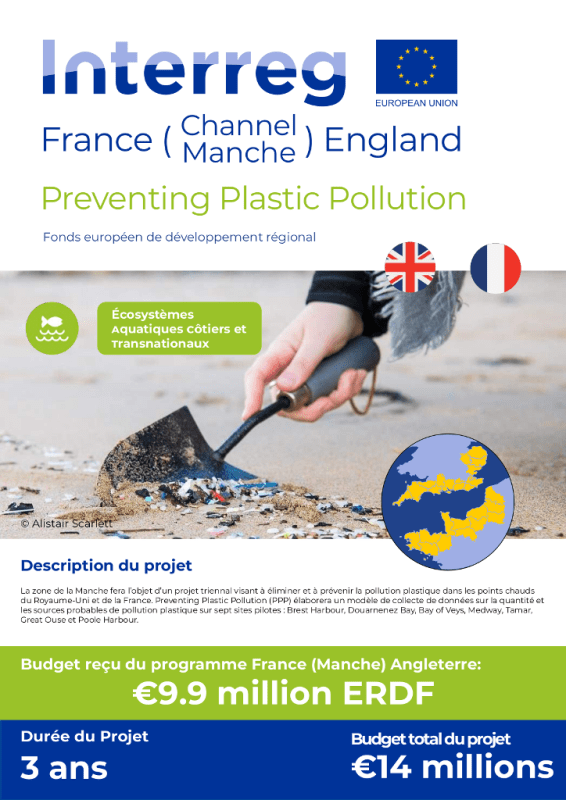Preventing Plastic Pollution
Preventing Plastic Pollution
Working in partnership with 18 organisations from across France and England, Preventing Plastic Pollution seeks to understand and reduce the impacts of plastic pollution in the marine environment. By looking at the catchment from source to sea, the project will identify and target hotspots for plastic, embed behaviour change in local communities and businesses, and implement effective solutions and alternatives.
Preventing Plastic Pollution (PPP) is a €14million funded EU INTERREG VA France (Channel) England Programme project co-financed by the European Regional Development Fund which will work across seven pilot sites: Brest Harbour, Bay of Douarnenez, Bay of Veys, Poole Harbour, and the Medway, Tamar, and Great Ouse estuaries.
The information gathered from research in these areas will allow the cross-Channel partnerships to tackle some of the four million tonnes of plastic waste that enter the sea via rivers every year.

Aims and Results of the project:
Project objectives:
PPP will improve the quality of Transitional Waters across the France (Channel) England area (SO 3.2) by;
– Developing a scalable and transferable mapping tool to provide quantifiable evidence of sources and quantities of plastic pollution in catchments.
– Developing an effective portfolio of innovative interventions to reduce plastic waste in or entering catchments.
– Transforming the behaviour of target groups and demonstrating best practice.
Expected project results:
PPP will improve water quality with
a) A 10 % improvement in good ecological status (WFD Descriptor 10) in transitional waters.
b) A reduction in the harm caused by plastic pollution in rivers and the sea equivalent to €38.8M-€126M (150 km river/coast cleared, 200 t plastic removed).
c) A plastic-free charter implemented by 650 businesses & 50 supply chains modified.
d) Projected uptake to include+10 more catchments 2 yrs post project, and 100 catchments after 5 years.
Partners involved are:
· Queen Mary University of London
· LABOCEA Conseil, Expertise et Analyses
· Syndicat mixte établissement public de gestion et d’aménagement de la baie de Douarnenez
· Office Français De La Biodiversité, Parc naturel marin d’Iroise
· Brest Métropole
· Centre national de la recherche scientifique
· Counseil départemental de la Manche
· Institut français de recherche pour l’exploitation de la mer
· Environment Agency
· The Rivers Trust
· Syndicat de bassin de l’Elorn
· ACTIMAR
· Brest’aim
· Westcountry Rivers Trust
· South East Rivers Trust
· Plymouth City Council
· Department for Environment, Food and Rural Affairs
· University of Plymouth
Oceanopolis actions – Brest’aim
Océanopolis – Brest’aim, Centre for Scientific and Technical Culture dedicated to the Ocean is one of the players involved in this European programme. A place for sharing and exchanging knowledge based on the scientific knowledge of the “Preventing Plastic Pollution” Programme, Océanopolis will inform and transmit information so that everyone can understand and prevent plastic pollution.
Océanopolis will offer students a programme of innovative educational workshops and educational days specially designed for their level, to help them better understand the world around them and grasp the societal and environmental challenges.
The programme will be based on the following themes:
– Educational workshops adapted to cycles 2, 3 and 4.
– A participatory science programme “Investigation on microplastics” for students.
– Training for teachers
– A School Plastik Hackaton
– An educational programme combining science and the arts ” Young Reporters for Arts, Science and the Environment ” on the theme of plastics
– School lectures
In addition to these actions, scientist culture events such as the Science Festival, the European Researchers’ Night will be identified as Zero Waste. Throughout this Interreg programme, conferences will be offered to the general public.
















